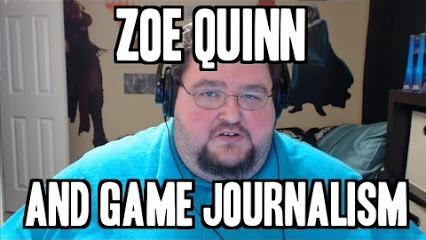EDIT: Almost two months later, Geoff has posted an update on GamerGate and the ugly turn things have taken, and outlines his ideas on how things can be brought to a peaceful conclusion.
EDIT #2: This article does not reflect my current views. With the rise of the alt-right (largely boosted by GamerGate), the continued harassment of games journalists and others who call for much-needed change and representation in the industry, and the sheer toxicity of the GamerGate movement, it has become clear that GamerGate is rotten to the core.
GamerGate is a hate movement, born solely to harass women and minorities and protest their increased representation in gaming under the guise of “ethical concerns.” To believe anything else was naivete on my part.
Not long after writing this article, I realized this, and after watching the horrifying rise of Trump and right-wing populism as my own political views have shifted even further left, I came to regret even entertaining the thought that anything good could have come from this movement.
GamerGate is a cancer on the games industry, and I wholly condemn it, as I should have done from the start.
In case you’ve been living under a rock the past few weeks, there’s been a war going on. It all began when the boyfriend of Zoe Quinn, a prominent female indie developer, posted allegations that she had been unfaithful and had slept with five other different guys. While that’s personal and, quite frankly, none of our business, the fact that the men that she slept with, including her boss and a Kotaku game journalist, were in positions to promote her game and her own interests, posed some ethical questions. Considering Quinn was also a poster-child of the feminist movement in games, this all made her out to be a giant hypocrite.
As the days went on, more and more questionable practices came out. Evidence showed another Kotaku writer who had personal relations with and a direct interest in the developer of a game that they had been promoting. Another prominent games journalist owns a PR firm that helps developers in promoting the very games that she is supposed to unbiasedly cover. And when another indie developer came forth with allegations that Zoe Quinn herself had hit on him at a wedding, he was immediately harassed and verbally abused into silence by Quinn’s mob.
Cue shitstorm. Gamers were outraged at this new revelation of the corruption in the mainstream gaming media, and the influence of “social justice warriors” (SJWs) on their beloved hobby. The gaming press were on the defense. And feminists took up arms against the misogynistic gamer horde that dared to insinuate that a woman had actually done something wrong.
If you were a member of the gaming press at this point, after being caught with your pants down (quite literally), you might try to smooth things over and hopefully humbly issue an apology. But no! Within hours of each other, close enough to raise more than a few eyebrows, several major gaming sites ran columns that made nearly the exact same proclamation. Gamers are dead! And it’s the best thing that could ever happen to the industry, since they’re all a bunch of woman-hating, misogynistic, basement-dwelling man-babies. And they probably strangle kittens on a regular basis too. But this is all just a tantrum because gamers don’t like diversity in their industry, and therefore need to fight the feminist hordes that threaten to ruin their beloved hobby.
So rather than accepting that they screwed up, the games press instead decide to demonize and attack their own target audience. Rather than apologizing and cleaning their act up, they turned the tables around – it’s not us, it’s the gamers that are the problem, and gamers should be ashamed because they’re ruining the industry. Never mind the fact that gamers are the ones that buy the games, read our articles, and ultimately give us our jobs in the first place. It’s an absolutely appalling and arrogant response at a time when both sides should be coming to the table discussing what is ethical in games journalism and trying to reach common ground.
Let’s get this out of the way before we even get started: any gamer who is even semi-aware of their fellow gamers knows that there is a very vocal minority among us that are total assholes. These are the people that issue death threats, make hacking attempts, and verbally abuse anyone that disagrees with them. But to lump all gamers in with these idiots is insulting at best, and to declare that your target audience is dead is suicidal.

All of these articles proclaiming the death of gamers were posted within hours of each other. Coincidence?
Enter GamerGate. Gamers, who are understandably miffed about being told that their identity is irrelevant and that they need to die, have banded together using Twitter and other social media sites to push for ethics reform in game journalism. In a rare display of unity, gamers across Twitter, 4chan, Tumblr, Reddit, and myriad other places have come together to prove that “gamers” are alive and well, we’re not the terrible people that the industry is trying to make us out to be, and that we can enact change. These gamers come from all walks of life, across a variety of races and cultures, male and female, gay and straight – disproving the press and social justice extremists’ allegations that gamers are all straight white chauvinist males. The hashtag #GamerGate, first used by actor Adam Baldwin, became their rallying cry, and immediately vaulted into the trending topics on Twitter. It could quite possibly be the most unified front of gamers in history, and if nothing else it fully proves that the death of gamers has been greatly exaggerated, despite how much the press doubles down on its “gamers are dead” narrative.
Of course, as with any conflict of this magnitude on the internet, there are terrible people on both sides. The people who cry out for social justice yet wish for a whole group of people to be eliminated, issue death threats against 10 year olds and then claim that’s acceptable…they’re all hypocrites. On the other side, the hackings, the threats, and other disgusting behavior coming from some “gamers” is just as bad. But the majority of the discourse from gamers has been reasonable – we simply want more transparency and a code of ethics for the gaming press. As Kotaku’s Jason Schreier has so eloquently pointed out in a TwitLonger post, the “social justice warriors” and “gamers” are just caricatures. “Most of the people who believe in social justice are not frothing radicals, and most of the people who consider themselves “gamers” are just normal people who really like video games,” argues Schreier, and if we want anything to get done we need to get rid of the “us vs. them” mentality and listen to each other. If we want games journalism to truly change and represent our best interests, we need to come to the table with an open mind, accept that the vast majority of people on the other side are not like the caricatures that have poisoned our perspective of them, and reach some sort of common ground.
I’m a gamer. It’s part of my identity. I’m also very much in favor of social justice. I fully support equality for women, I’m a big supporter of gay rights, and I believe we should have more recognition of these people in the industry. But the two are not irreconcilable. Just because I am a gamer doesn’t mean I’m a basement-dwelling misogynist with no life, and just because I am a social justice supporter doesn’t mean I think that every game should have a female protagonist, that rescuing a kidnapped princess is sexist, or that every game should offer some sort of commentary on social justice issues.
An article posted on Gamasutra (linked here with DoNotLink) during the “Gamers are dead” blitzkrieg of August 28 even went so far as to say that we should eliminate “fun” as a criteria in our discussion of video games. Games should not seek to be “fun”, but should strive for qualities such as “healing,” “pro-social,” or “enlightening.” I am going to call bullshit on this right here and now. Yes, there are times when games can be an effective outlet for emotion or social commentary, such as in Brothers: A Tale of Two Sons or Mass Effect. But I don’t play Mario Kart or Left 4 Dead for their insightful commentary on the plight of women in society, I play them because I get enjoyment out of them. They’re fun. End of story. Games by definition are an entertainment medium, ergo something meant for enjoyment – meaning that we should be having fun playing them. To say that games should not be fun reeks of pretentiousness.
But let’s not get off course. The main force behind the GamerGate movement is to expose the corruption in the mainstream gaming media, not comment on social justice, and to convince games journalists to abide by a basic code of ethics. There should be full transparency in cases where a journalist has a personal investment in a game, whether it be crowdfunding, personal relationships with a developer, or “perks” given to said journalist by the developer. A TwitLonger by AlrightAnon sums up the type of ethical reform GamerGate hopes to achieve:
1) Writers should disclose how they obtained their copy of the game, and any other financial contributions. We recognize that crowdfunding and patronage is a great way to support small, independent developers who want to avoid the corporate system and should not be discouraged. However, we believe it would be better for the writer to at the very least strive to maintain and uphold transparency.
2) Writers should disclose any serious friendships or romantic/sexual relationships if they’re involved in the story or review. Ideally, writers should simply recuse themselves from the review. However, we recognize that smaller sites are hard-pressed for writers as it is and so again would prefer to at least have a greater degree of transparency.
3) Writers should behave in a professional manner on social media: using their platform to maliciously mock, deride and insult others should be a punishable offense. As public figures, these personalities are role models. Their public behavior plays a major role in shaping the public discourse. Writers should be professional, respectful, and polite at all times. We understand that trolls can be nasty, but you should never stoop to their level. Simply do not engage trolls, or block them quietly and move on.
4) When covering issues like harassment and death threats, writers should never point fingers without having any solid, non-circumstantial evidence. Unfortunately, the games media has had a history of accusatory reporting rivaling figures like Nancy Grace. Regardless if Zoe Quinn’s allegations were true, media fingerpointing unfortunately led to a support group for at-risk, vulnerable men (Wizardchan) being targeted for harassment and bullying. The media should show more responsibility in upholding the international ideal of “innocent until proven guilty”.
5) Likewise, if there is no evidence other than hearsay, the writers should acknowledge it as such. Treat all claims with a healthy doubt. While this may be seen as “victim blaming”, writers have a responsibility to prevent a miscarriage of justice. Leaping to conclusions helps nobody in the end and may accidentally hurt innocent people.
6) Games should be judged for their content and how fun they are to play. While a political critique may have merit, it should not affect the judgement of the game’s quality and should be discussed in separate. Writers should recognize that said political/social perspective may be subjective, and that there are alternate viewpoints. The idea is to encourage a “big tent” community where people from all different ideologies and walks of life can look at a game and judge if it’s good for them or not.
7) When discussing a political issue, writers should not try to marginalize or silence any opposing viewpoints, no matter how socially unacceptable they may be. The idea here is to discourage hostility and instead promote positive, constructive dialogue. Again, a non-hostile article will set an excellent role model for the commentators.
8) No matter how socially unacceptable they may be, opinions are not a valid reason to ban someone from comments or any other forum. Everyone should be allowed a seat at the table provided they play nice. Promoting inclusiveness means having to include people you disagree with. Otherwise, you are contributing to a hostile, combative environment. If someone behaves poorly, they should be banned in a quiet, low-profile manner to avoid giving them the attention.
9) Writers should not use their position to target individuals for harassment on social media. Again, if someone says something objectionable, do not give them any attention or validation. Simply ignore them to starve them out. There is nothing that warrants targeting a person for harassment and abuse.
10) While no one is above criticism, writers should not deliberately try to silence one another or deny them a platform to speak. While journalists should hold each other accountable for their ethics, at the same time they should not be at each other’s throats. Infighting among games writers only encourages infighting among gamers.
11) Writers should abstain from personal attacks at all times, no matter the circumstances. This may seem redundant, but this is arguably the most important point. As public figures, games journalists need to be setting the standard for discourse. The gaming community has been plagued by terrible behavior, and rather than try to improve things most writers have instead only joined in on it. In the end, this only leads to more people being hurt and lashing out, keeping the problem going. Games writers promoting positivity and civility would go a long way towards improving the community. With the perks of being a high-profile figure come major responsibilities.
These are basic guidelines that any decent journalist in any medium should find perfectly acceptable. Any journalist is expected to abide by a similar code of ethics, so why should those in the gaming media be any different? Unfortunately, for the most part, the gaming press has not taken these to heart. There have been the odd concessions, such as Kotaku banning its writers from funding developers on Patreon, or Polygon requiring its writers to disclose any personal interests and investments they have made that may affect their impartiality, but for the most part the mainstream gaming press has simply doubled down on their insults and vilification of their core audience.
The future of the gaming press is not in the mega corporate sites like Kotaku, IGN, or Polygon. Gamers are leaving them in droves now, and who can blame them? After all, these are the sites that have declared our identity dead and have made every single one of us out to be the enemy. Instead, the future of games “journalism” is in the hands of smaller independent sites and YouTubers. People like TotalBiscuit and Boogie2988, alongside sites such as GamesNosh and Tech Raptor have become the voice of reason throughout this debacle. Unless there are sweeping reforms among the large corporate sites, they run the risk of losing vast numbers of their audience to these alternate independent sources who gamers see as having more integrity and better representatives of their interests.
4P is proud to stand among those independent sites, and we’ve taken this time to look at our place in all this mess. We’ve always tried to be transparent – though we buy most of our reviewed games with our own money, whenever we receive a review copy we are transparent about it at the beginning of the review, and we grade it just as we would any other game. We don’t even have ads right now – the entire cost of 4P comes out of my own pocket – but in the future, if and when the site outgrows what I can support, we will need to be sure that we don’t receive ad revenue from sources that will pressure us to compromise our integrity. The background images we use on our site do not represent any type of promotion or developer partnership – we simply select an upcoming or recently-released game to showcase with no interest in promoting it or receiving any recognition. And though we have not had any examples so far, whenever we have any personal investment in a game we would offer full disclosure beforehand. It’s inevitable that such cases are going to arise, especially as the site grows and we establish more relationships with game developers and publishers.
That’s all great, but it needs to be codified. Even though we are still a small site that doesn’t have nearly as many connections with the industry as some of the larger sites, we will be instituting a new ethics policy to be posted in the next day or two. These new policies will guide us going forward, hopefully allowing for plenty of transparency and maintaining the trust of our loyal readers. We respect our readers and appreciate every single person who takes the time to read our content, and we would never seek to villify them or alienate them, and we hope that they will hold us to the standards that we are setting for ourselves.
The traditional gaming press needs to address the concerns of gamers and seek some sort of ethics reform, or they risk extinction. Meanwhile, independent sites like 4P and the others that have stood with gamers in this conflict need to remember it years from now if they are confronted with a situation where they run the risk of compromising their integrity. Gamers aren’t going anywhere, no matter how hard the mainstream press may try to silence us. GamerGate has proven that gamers from all walks of life can band together to seek reform and make our hobby better, and even though there are a few bad apples that have given us a bad name, the vast majority of us simply want civil discourse and transparency among the gaming press. We are not dead; in fact, we are more energized and united than ever before.
Maybe if we look at it from that point of view, the stereotypical “gamer” really is dead. We have to concede that gamers have historically had a bad rep – a vocal minority has caused us to be known for flaming each other on forums, trash-talking each other in multiplayer games, and being hostile toward any perceived threat to our beloved hobby. But GamerGate has proven that when the situation calls for it, we can overcome our differences and stand united to make the games industry a better place. We’ve become a coalition that spans across the globe, crossing borders of race, gender, class, and sexuality, seeking civil discussion and reform in a troubled industry. Let’s hope that the future of “gamers” is one of inclusiveness and civility, and that the toxicity that has plagued our identity through the years doesn’t continue to color people’s view of us. If that’s the new face of the term “gamer,” then I’m more than happy to see the old one die.
Gamers are dead. Long live gamers.
































*clap clap*